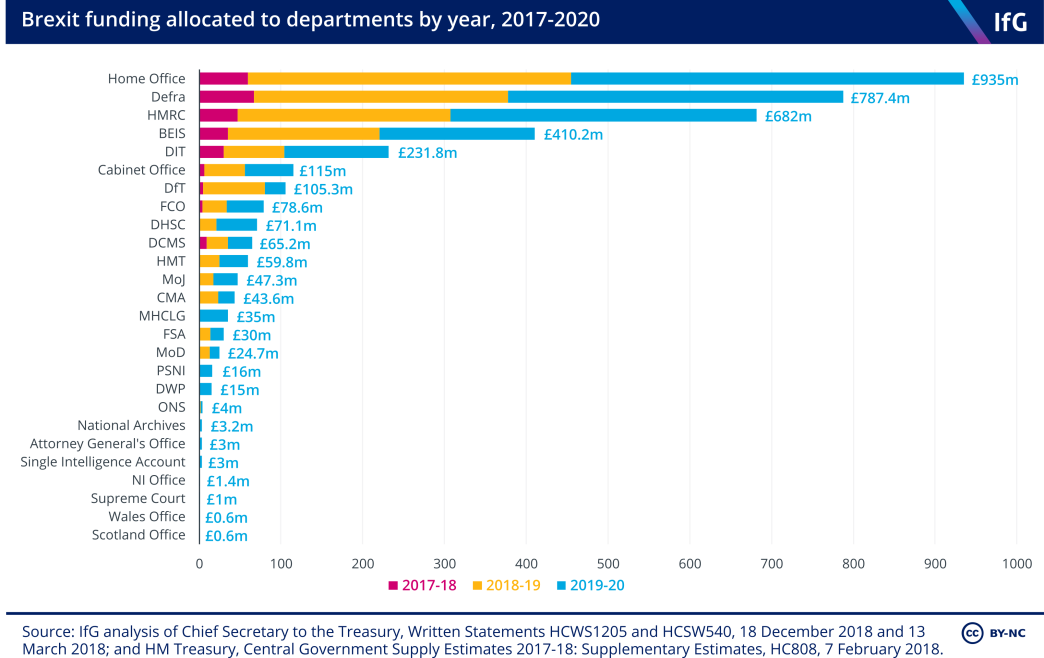Brexit billions sound big, but won’t solve ‘no deal’
The decision to agree this latest cash injection is being reported as part of a wider ramping up of preparations for a ‘no deal’ Brexit.
Government departments will get more money for Brexit preparations. Lewis Lloyd argues that the cash will come too late for no deal, and that government departments are struggling to spend the money they already have.
The Chancellor has allocated an extra £2 billion of Brexit money to government departments for 2019/20. The decision to agree this latest cash injection is being reported as part of a wider ramping up of preparations for a ‘no deal’ Brexit.
But departments already have funding for the period up to March. And in fact, they are struggling to spend the £1.5bn for 2018/19 fast enough, casting doubt over their Brexit preparations.
This money will not help the UK be ready for no deal in March
The latest funding will only be made available to departments after the UK has left the EU, with or without a deal. Departments’ readiness for March is dependent on what they do with the money they already have for this financial year – and there are indications they are struggling to spend it.
At the Budget, the Office for Budget Responsibility estimated a likely underspend on Brexit of £400m for 2018/19. The Chancellor has apparently expressed concerns that only one third of the £1.5bn allocated in March had been spent, with only a few months to go.
Meanwhile, John Manzoni admitted to the Public and Constitutional Affairs Committee (PACAC) last week that policy implementation had “lagged”, and that it had taken time to hire “skilled and capable people”.
The Health and Social Care department will see the largest increase in funding
The Home Office, Department for Environment, Food and Rural Affairs (Defra) and HM Revenue and Customs (HMRC) will be the main recipients of Brexit funding for the third year running. Given their vital roles in preparing the border and UK businesses for exit in March, that makes sense.
The Department for Health and Social Care (DHSC) will see the largest increase in funding compared to this year. This will, presumably, help support the department’s new role as the world’s “largest buyer of fridges” as it works to ensure the unimpeded supply of medicines and medical devices to UK hospitals after Brexit.
The Department for International Trade (DIT)’s allocation has also increased dramatically as it accelerates efforts to roll over existing trade agreements with non-EU countries.

Departments such as the Cabinet Office, HM Treasury (HMT) and the Foreign and Commonwealth Office (FCO) are also set to receive more money. Agencies taking over significant responsibilities from the EU like the Competition and Markets Authority (CMA) and the Food Standards Agency (FSA) are also getting more cash.
Some areas are getting Brexit cash for the first time
The Police Service of Northern Ireland (PSNI) is the most striking addition to the list of bodies set to receive Brexit funding. Its £16m allocation will help pay for 308 new officers and staff by April 2020, to ensure it can maintain law and order in the event that any change at the Irish border.
Security agencies are receiving Brexit money for the first time through the Single Intelligence Account, possibly to make up for the anticipated drop in security cooperation with the EU. Both the Attorney General’s Office and the Supreme Court also make first appearances on the list: it seems we can look forward to more Brexit legal advice, and legal challenges, in the coming year.
There are new entries for two big departments, too: the Ministry of Housing, Communities and Local Government (MHCLG) and the Department for Work and Pensions (DWP). Both had previously been supporting Brexit work with their existing budgets, but evidently expect pressures to increase after Brexit day.
The Brexit money so far is only part of the picture
The Government maintains that the £1.5bn from last year will all be spent, with the latest £2bn to be added on top of that. But that implies a concrete plan for rapidly accelerating spending in the coming months. It is not clear what that plan looks like, or how it will work.
But whatever the final total is, the money allocated to departments so far will not represent anything like the full direct cost of a no deal Brexit. As John Manzoni told PACAC last week, more and more civil servants will need to be reallocated to Brexit work as the prospect of no deal looms ever larger.
That may not mean increasing departmental spending, but it does mean resources being diverted from other work. And Manzoni told the committee that, ultimately, he expected more money to be required anyway. We may only have seen the beginnings of the true Brexit bill.
- Topic
- Brexit Public finances
- Keywords
- Public spending Health
- Department
- Department of Health and Social Care
- Publisher
- Institute for Government